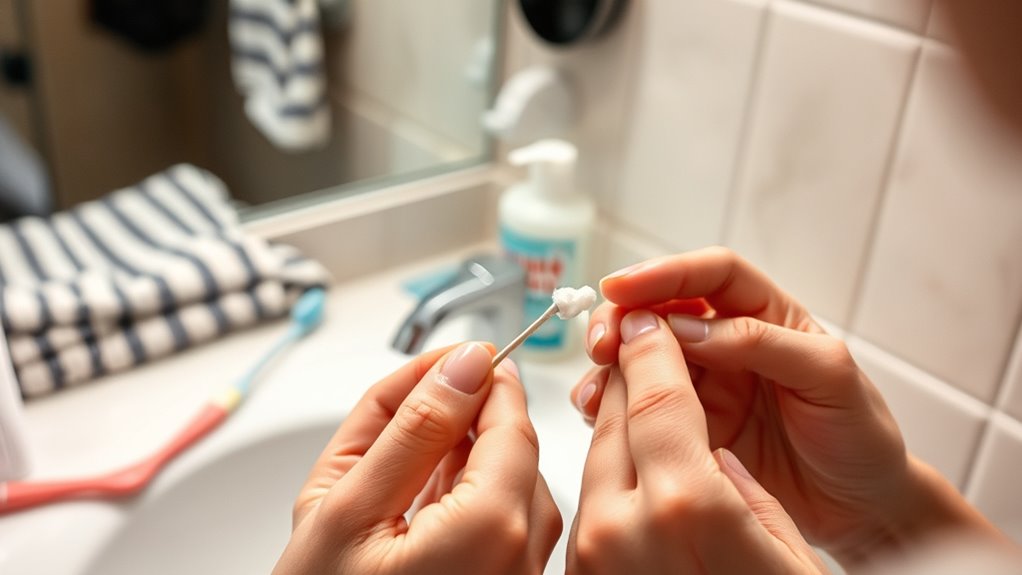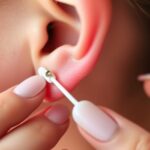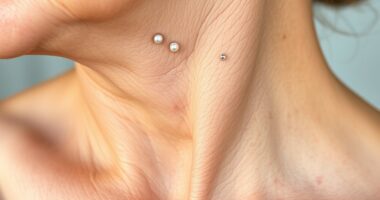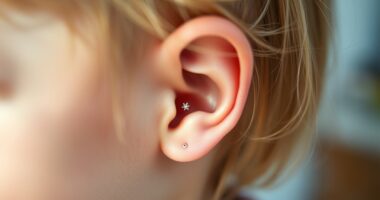When sharing dorm bathrooms, always wash your hands thoroughly before touching your piercing, and avoid reusing communal towels or washcloths. Use disposable wipes or paper towels to turn faucets and open doors, preventing bacteria transfer. Clean your piercing with a gentle, saline solution twice daily, and keep jewelry in a personal, sterile container when not in use. Protect your piercing during showers with waterproof covers, and maintain hygiene routines to lower infection risk. For more tips, keep exploring these essential hygiene hacks.
Key Takeaways
- Always wash your hands thoroughly before touching or cleaning your piercing to prevent bacterial transfer.
- Use disposable wipes or paper towels to turn on faucets and open bathroom doors, avoiding contact with shared surfaces.
- Clean your piercing twice daily with a sterile, fragrance-free saline solution, avoiding harsh chemicals or scrubbing.
- Keep jewelry stored in a personal, sterile container when not being checked or cleaned to prevent contamination.
- Protect your piercing during showers with waterproof bandages or caps to keep it dry and reduce infection risk.

Getting a dorm piercing can be exciting, but maintaining proper hygiene is vital to prevent infections and ensure healing. When you’re sharing bathrooms in college dorms, it’s especially important to pay close attention to your piercing aftercare and bathroom hygiene. Dorm bathrooms are busy and often less sanitized than your own space, so taking extra steps keeps your new piercing safe and your healing process smooth.
First, always wash your hands thoroughly with soap and water before touching your piercing or cleaning it. Dirty hands transfer bacteria easily, which can lead to infections. During your piercing aftercare routine, avoid touching the jewelry unnecessarily, and if you do, make sure your hands are spotless. Use a gentle, fragrance-free saline solution to clean the area twice daily. This helps remove any crust or debris that could harbor bacteria. Be gentle—don’t scrub or use harsh chemicals, which can irritate the piercing and slow healing.
When it comes to bathroom hygiene, be mindful of the surfaces you touch. Always use a paper towel or disposable wipe to turn on faucets and open doors after washing your hands. Many dorm bathrooms have shared sinks, which can be breeding grounds for germs. Avoid splashing water directly onto your piercing or getting it wet unnecessarily, especially during the initial healing phase. If you need to rinse your piercing, use a clean cup or a disposable rinse bottle to minimize contact with bathroom surfaces.
It’s also wise to keep your jewelry in a clean, personal container when you’re not cleaning or checking on your piercing. Avoid sharing towels, washcloths, or any personal items that could transfer bacteria to your piercing site. When drying your face or hands, pat gently with a clean, disposable paper towel rather than using communal towels or cloths that might harbor germs.
Additionally, be cautious with the use of public or communal bathroom accessories. Never reuse the same washcloth or towel for your face or piercing area. Instead, keep a small pack of sterile gauze or cotton swabs on hand for gentle cleaning. Consider wearing a shower cap or using a waterproof bandage over your piercing when showering to prevent water and soap from irritating or infecting the area. Regularly disinfecting your jewelry with appropriate solutions can further reduce the risk of infection during healing.
Frequently Asked Questions
How Often Should I Clean My Piercings in a Shared Bathroom?
You should clean your piercings at least twice daily as part of your piercing cleaning routines. When sharing bathroom facilities, it’s essential to follow strict bathroom hygiene practices to prevent infections. Always wash your hands thoroughly before touching your piercings, and use a gentle saline solution for cleaning. Regular cleaning helps keep your piercings healthy and reduces the risk of irritation or infection, especially in communal bathroom environments.
Can Sharing Bathroom Facilities Cause Infections in Piercings?
Sharing bathroom facilities can indeed cause piercing infections if bathroom hygiene isn’t maintained. You might pick up bacteria from sinks, counters, or towels, which can lead to infection in your new piercing. To protect yourself, always wash your hands thoroughly before touching your piercing, avoid touching it with unclean hands, and clean your piercing regularly with recommended solutions. Staying vigilant helps prevent complications and keeps your piercing healthy.
What Products Are Best for Disinfecting Piercings Quickly?
For disinfecting piercings quickly, you want effective piercing cleaning and disinfection techniques. Use a sterile saline solution or a piercing aftercare spray specifically designed for piercings. Avoid harsh alcohol or hydrogen peroxide, as they can irritate the skin. Gently clean around the piercing with a cotton swab or clean cloth, ensuring you remove any dirt or bacteria. These methods help prevent infections, especially when sharing bathroom facilities in college dorms.
Is It Safe to Use Communal Hand Soap on Piercings?
Using communal hand soap for piercing aftercare isn’t recommended because bathroom hygiene varies, and shared soap may carry bacteria. Instead, you should use a sterile saline solution or a gentle, fragrance-free cleanser designed specifically for piercings. Always wash your hands thoroughly before touching your piercings, and avoid sharing products. Proper bathroom hygiene and careful aftercare help prevent infections and promote healing.
How Can I Prevent Cross-Contamination Between Piercings and Surfaces?
To prevent cross-contamination between your piercings and surfaces, always practice good hygiene. Avoid touching your piercings with unwashed hands, as this can transfer bacteria and cause surface contamination. Use a clean tissue or paper towel if you need to touch your piercing, and disinfect surfaces regularly. Be mindful of your piercing touch, especially in shared bathrooms, to keep both yourself and others safe from infections.
Conclusion
Sharing bathrooms in college dorms can increase the risk of infections, but you can stay safe with simple hygiene hacks. Remember, over 60% of college students have reported skin issues from shared spaces—don’t be part of that statistic. Keep your piercings clean, use disinfectant wipes, and wash your hands regularly. Staying vigilant not only protects your health but guarantees your dorm experience stays fun and worry-free. Stay smart, stay safe!
I’m Gillian. I love piercings and tattoos- there’s something about the way they make your body look that just makes me happy. I started this blog to share my passion for piercings and tattoos with the world and to help people who are thinking of getting their first piercing or tattoo.
I’ve been writing about piercings and tattoos for a while now on piercings-body.com. I love sharing my knowledge with others and helping people make informed decisions about their bodies.

















